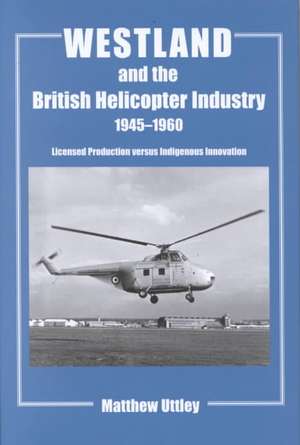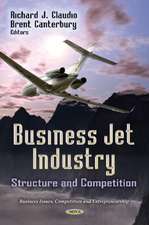Westland and the British Helicopter Industry, 1945-1960: Licensed Production versus Indigenous Innovation: Studies in Air Power
Autor Matthew R.H. Uttleyen Limba Engleză Hardback – 30 sep 2001
| Toate formatele și edițiile | Preț | Express |
|---|---|---|
| Paperback (1) | 436.14 lei 6-8 săpt. | |
| Taylor & Francis – 26 noi 2015 | 436.14 lei 6-8 săpt. | |
| Hardback (1) | 1057.09 lei 6-8 săpt. | |
| Taylor & Francis – 30 sep 2001 | 1057.09 lei 6-8 săpt. |
Preț: 1057.09 lei
Preț vechi: 1289.13 lei
-18% Nou
Puncte Express: 1586
Preț estimativ în valută:
202.30€ • 210.42$ • 167.01£
202.30€ • 210.42$ • 167.01£
Carte tipărită la comandă
Livrare economică 14-28 aprilie
Preluare comenzi: 021 569.72.76
Specificații
ISBN-13: 9780714651941
ISBN-10: 071465194X
Pagini: 256
Dimensiuni: 156 x 234 x 16 mm
Greutate: 0.52 kg
Ediția:1
Editura: Taylor & Francis
Colecția Routledge
Seria Studies in Air Power
Locul publicării:Oxford, United Kingdom
ISBN-10: 071465194X
Pagini: 256
Dimensiuni: 156 x 234 x 16 mm
Greutate: 0.52 kg
Ediția:1
Editura: Taylor & Francis
Colecția Routledge
Seria Studies in Air Power
Locul publicării:Oxford, United Kingdom
Cuprins
Helicopter International
"an excellent study"
Air International April 2002: - "the most comprehensive source of information on Britain"s helicopter procurement policy ... and an invaluable database for the student of British Aviation history. Recommended."
Air International
"offers extensive coverage of significant aspects of the application of military aviation in the 20th Century"
"highly recommended...a worthy addition to the shelves of anyone who seriously studies the UK aircraft industry"
- Air Enthusiast
"an excellent study"
Air International April 2002: - "the most comprehensive source of information on Britain"s helicopter procurement policy ... and an invaluable database for the student of British Aviation history. Recommended."
Air International
"offers extensive coverage of significant aspects of the application of military aviation in the 20th Century"
"highly recommended...a worthy addition to the shelves of anyone who seriously studies the UK aircraft industry"
- Air Enthusiast
Descriere
This study explains how Westland dominated British helicopter production and why government funding and support failed to generate competitive "all-British" alternatives.

























